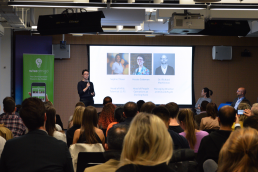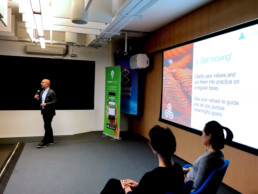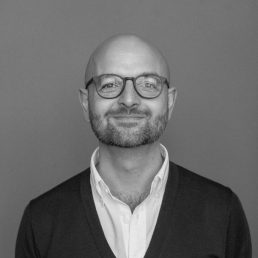What comes to mind when you think about the future of work? Often the focus is solely on how new technologies will either change the way we work or eliminate jobs completely; only rarely is it considered how the changing dynamics of the workplace will affect people.
Yet there are significant demographical shifts in the workplace. Freelancers now make up more than 15% of the UK labour force, while 96% of UK businesses have less than ten people in them and don’t have a dedicated HR department. On an individual level, these shifting demographics are most likely to impact on our future plans and career goals over the next decade.
Our Future of Work events directly address how people can carve out careers – as well as finding meaning and purpose – in this uncertain future. For the first event, ‘Developing People’, we invited three remarkable individuals to share their experiences and suggest how businesses can create environments that teams can all thrive in.
“It’s easy to rely on those above you to tell you what your next job should be,” explains Sophie Theen, Head of HR and Talent at financial challenger consultancy 11:FS. “One of the things we’re doing is to encourage people to have more honest career conversations.”
“Just because they’ve graduated from a certain degree doesn’t meant it has to be their lifelong career. So we spark those conversations at a very early stage.”
— Sophie Theen of 11:FS
Sophie’s approach towards helping employees develop their careers at 11:FS has been to facilitate the creation of Guilds. These in-house groups bring people together based on their ‘craft’ (i.e. Product Managers in a ‘Product Guild’ or Designers in a ‘Design Guild’).
“This has helped a lot of junior people in our workforce. Just because they’ve graduated from a certain degree doesn’t meant it has to be their lifelong career. So we spark those conversations at a very early stage.”
Each Guild is led by senior members of the 11:FS team and is focused on enabling employees to develop their skillsets in a way that will benefit them going forwards.
“They will talk to you about a specific future role that you want to aim for. They make sure you’ve got measurable goals, but also about what is achievable, relevant and how long it will take to get to this point.”

Also taking an innovative approach to knowledge sharing in the workplace is Hessie Coleman, Head of People Operations at Starling Bank. Having taken a roundabout route to her current role (via marketing and HR positions at companies including Hive and Centrica). Hessie understands the role someone is in right now might not be the one they want forever.
“You are put into a box [in larger companies] and that’s a real shame because you’re not tapping into people’s skills and talents.”
— Hessie Coleman of Starling Bank
“Something that really frustrated me in larger companies was that you can’t really change anything at that size and scale,” she recalls. “You are put into a box and that’s a real shame because you’re not tapping into people’s skills and talents.”
Hessie is behind the company’s Passport to Starling scheme, a novel take on a rotational development programme which allows anyone who joins in a customer service role to rotate around the rest of the business on secondments.
“For such a customer-driven business, having that customer service knowledge and that deep understanding of what customers actually want and embedding that across the rest of the business is so useful.”
For our third speaker, Dr Richard MacKinnon, Managing Director of WorkLifePsych, the increased flexibility and informality we’re seeing in the workplace requires a new way of thinking among workers.
“Instead of predicting exactly what people will need in terms of technical skills, we should train people in psychological skills that help them deal with these challenges.”
— Dr Richard MacKinnon of WorkLifePsych
“If you want to work flexibly, you need to think flexibly,” he suggests. “We can’t predict the future but we know that there’ll be ambiguity and uncertainty. Instead of predicting exactly what people will need in terms of technical skills or exposure to certain experiences, we should train people in psychological skills that help them deal with these challenges.”
As a workplace psychologist, Richard applies tried-and-tested psychological flexibility principles to help people deal with workplace issues before they need to seek professional help.
“Because these are skills, everyone can develop them. We’re not talking about super-human people, we’re talking about anyone who is willing to put in the time to practice these skills. It helps you improve your resilience and your job satisfaction, become more productive and strengthen your mental and physical wellbeing.”
At the core of Richard’s work are three simple ideas: show up (focus on being in the here and now), let go (learn to see thoughts as passing mental experiences) and get moving (set meaningful goals). Together, these ideas act as tools that can be applied when having difficult workplace conversations, attempting to embrace change and dealing with periods of ambiguity.

“When we’re in touch with our values, we can use them to guide our behaviour and use them to respond to difficult situations rather than our emotions. When you slam a door or send a snarky email, your emotions were hijacking you. Using values to guide ourselves allows us to deal with all the difficulties we face.”
If you’d like to come along to one of our upcoming Future of Work events, then follow us @WiseAmigo our social channels below or sign up to our mailing list to be the first to know when tickets are available. We look forward to seeing you there!

Hessie Coleman
Head of People Operations at Starling Bank, a challenger bank, ranked Top 20 Start-Ups 2018, with a culture of internal collaboration (‘Passport to Starling’). Follow Hessie on Twitter.

Dr Richard MacKinnon
Chartered Psychologist, Coach and Managing Director of WorkLifePsych, a team of workplace psychologists specialising in people development. Follow Richard on Twitter.
Development is a journey. The WiseAmigo app and community are here to help you along the way. Join the WiseAmigo community, create a Spotlight, discover more insightful content and reflect on your development journey today!
SaveSave
SaveSave

